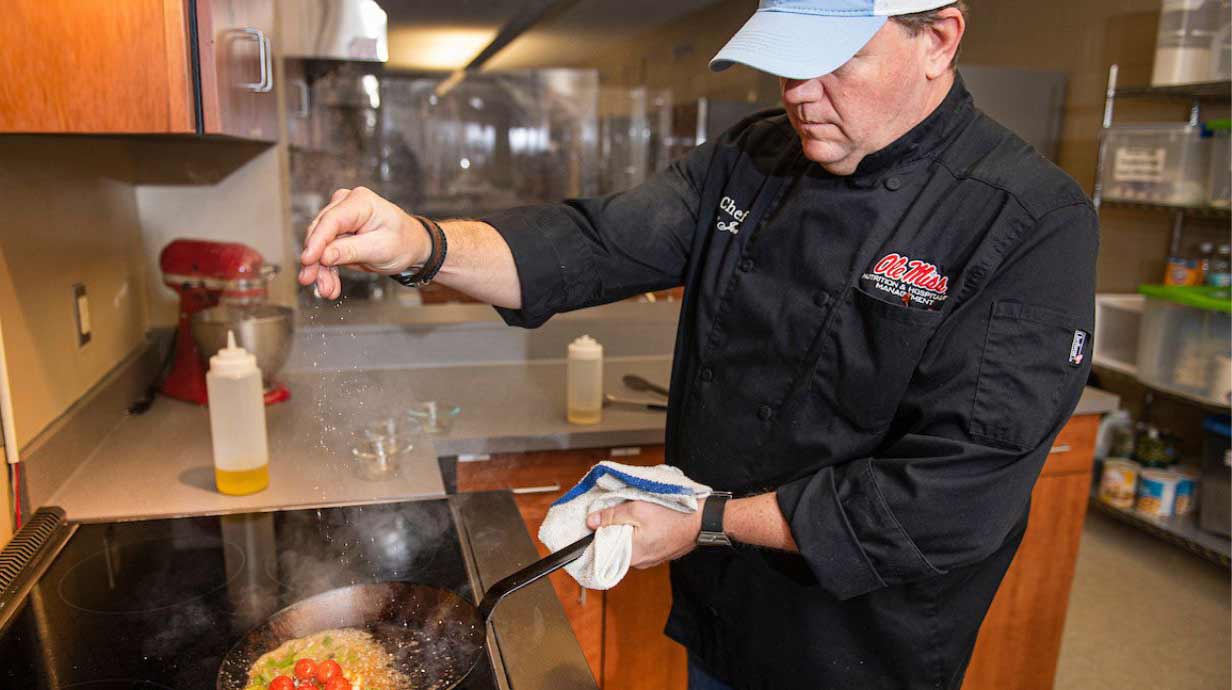Students must be admitted to the Master of Science in Food and Nutrition Services Graduate Program (MSFNS) at the University of Mississippi before being considered as a candidate for the University of Mississippi Coordinated Program in Dietetics (UM CP).
The application for UM Graduate School can be found here, and the admission requirements for the MSFNS can be found here. Students may submit applications to the MSFNS and the UM CP at the same time. However, the UM CP application will not be considered prior to acceptance into the MSFNS.
Additional admission requirements include either a DPD Verification Statement or successful completion of the following pre-requisite courses. Students may apply to the UM CP before the courses are completed, but will need to indicate how and when they plan to satisfy the pre-requisites prior to the start date.
Required pre-requisite courses, include:
- Servsafe, either an academic course or current certification (UM equivalent NHM 111)
- Basic Foods or Culinary course (UM equivalent NHM 211/213)
- Menu development course (UM equivalent NHM 309)
- General Nutrition course (UM equivalent NHM 311)
- Nutrition Assessment course (UM equivalent NHM 410)
- Medical Nutrition Therapy course (UM Equivalent NHM 412)
- Foodservice Management course (UM equivalent NHM 441)
- Minimum 6 hours of Human Anatomy & Physiology w/2 hours lab (UM equivalent Bisc 206 & 207) OR minimum of 3 hours of a 300-level or higher physiology course w/1 hour lab (UM equivalent BISC 330)
- Minimum 3 hours organic chemistry w/1 hour lab (UM equivalent Chem 221/225)
- OR combined survey of organic and biochemistry course
- Minimum 3 hours biochemistry (UM equivalent Chem 271) OR combined survey of organic and biochemistry course
- Psychology or Sociology course (UM equivalents Psych 201 and Soc 101 are examples)
Application Procedures & Deadlines
Students who would like to apply to the Coordinated Program in Dietetics must:
- Apply to the MSFNS by completing the UM Graduate School application.
- Complete the online CP Application Form. You may submit this form before you are admitted to the MSFNS, but your CP Application will not be considered until your status in the MSFNS is determined.
- (Optional) Submit updated versions of your resume, personal statement, recommendation letters, and/or transcripts via email to the UM CP Director.
If your original application was submitted >6 months ago, we recommend submitting an updated version.
The deadline for regular applications is 5:00 p.m. on January 15th of each year.
- Current UM undergraduate and graduate students can submit their admission application early. Early applications are due by 5:00 p.m. on October 15th.
- Up to 5 students may be selected during this application period.
- If a student applies and isn't selected during this application period, they can request to be considered again during the regular application period without submitting a new application.
Students will be notified within 4 weeks of the outcome of their application after the first round of selections. The following areas are considered during the first round of selections and scoring is based on information gleaned from all areas of the application (e.g., resume, personal statement, recommendation letters, and transcripts).
- Academic Achievement
- Desirable characteristics: perseverance, initiative, time management, interpersonal skills, and self-awareness
- Professional Skills & Experience: clinical, food preparation and/or serving, management, and other (such as fluent in a language other than English or teaching).
To assist in scoring your application, we recommend that you indicate the approximate hours/week and approximately how many weeks/months/years you were involved in specific volunteer activities or jobs. These can be indicated directly on your resume or described in your personal statement.
Students who advance to the second round of selections will be asked to interview with a panel of preceptors, the UM CP Director, and/or current students and faculty via Zoom.
- The following areas are scored during the second round of selection: verbal communication skills, organizational skills, conflict resolution, and self-awareness.

